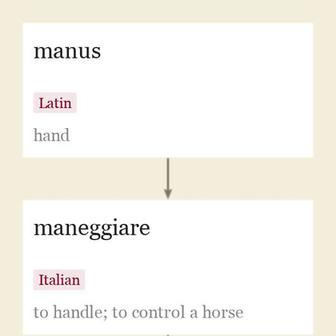manageable (adj.)
1590年代,“能够被处理或操纵的”; 大约1600年,“能够被治理或控制的”,来自 manage + -able。相关: Manageably。
manageable 的相关词汇
英语形容词的常见词尾和构词元素(通常基于动词),通常添加“能够; 允许; 值得; 需要; 被______ed”的概念,有时是“充满,引起”的意思,来自法语 -able 和直接来自拉丁语 -abilis。它正确的形式是 -ble,来自拉丁语 -bilis(元音通常来自被后缀的动词的词干结尾),它代表了 PIE 的 *-tro-,一个用于形成工具名词的后缀,与英语 rudder 和 saddle(名词)的第二个音节同源。
在英语中是一个活生生的元素,用于新的构词形式,无论是来自拉丁语还是本土词汇(readable, bearable),也与名词一起使用(objectionable, peaceable)。有时具有积极的意义(suitable, capable),有时具有中性的意义(durable, conformable)。它的意义变得非常灵活,例如一个 reliable witness,一个 playable foul ball, perishable goods。17世纪的作家有一个 cadaverable “致命的”。
To take a single example in detail, no-one but a competent philologist can tell whether reasonable comes from the verb or the noun reason, nor whether its original sense was that can be reasoned out, or that can reason, or that can be reasoned with, or that has reason, or that listens to reason, or that is consistent with reason; the ordinary man knows only that it can now mean any of these, & justifiably bases on these & similar facts a generous view of the termination's capabilities; credible meaning for him worthy of credence, why should not reliable & dependable mean worthy of reliance & dependence? [Fowler]
以一个具体的例子来说明,只有一个能干的语言学家才能告诉我们 reasonable 是来自动词还是名词 reason,它最初的意义是可以推理出来的,还是可以推理的,还是可以被推理说服的,还是有理智的,还是听取理由的,还是符合理性的; 普通人只知道它现在可以意味着任何一个,因此合理地认为这个词尾的能力是广泛的; 对他来说, credible 的意思是值得信任的,为什么 reliable 和 dependable 不能意味着值得依赖和信任?[福勒]
在拉丁语中, -abilis 和 -ibilis 取决于动词的屈折元音。因此,在古法语、西班牙语、英语中有变体形式 -ible。在英语中, -able 倾向于与本土(和其他非拉丁语)词汇一起使用, -ible 则与明显的拉丁语起源的词汇一起使用(但也有例外)。这个拉丁语后缀在词源上与 able 没有关联,但它长期以来一直与之相关联,这可能有助于它作为一个活生生的后缀的活力。

1560年代,“处理、训练或指导”(马匹),源自现已废弃的名词 manage“处理或训练马匹; 马术”(见 manege,这是它的现代复兴),源自古法语 manège“马术”,源自意大利语 maneggio,源自 maneggiare “处理、触摸”,尤其是“控制马匹”,最终源自拉丁语名词 manus “手”(来自 PIE 根 *man-(2)“手”)。
“通过行政能力控制或指导任何业务”的扩展意义始于1570年代; “手持(工具或物品)使用”意义始于1580年代。“通过努力实现”(因此“成功完成”)的意义始于1732年。1650年代建议使用“获得、处理事务”的不及物意义,在19世纪中期经常使用。相关: Managed; managing。1933年使用了 Managed economy。
Manage literally implies handling, and hence primarily belongs to smaller concerns, on which one may at all times keep his hand: as, to manage a house; to manage a theater. Its essential idea is that of constant attention to details: as, only a combination of great abilities with a genius for industry can manage the affairs of an empire. [Century Dictionary]
Manage 字面上意味着处理,因此主要适用于较小的问题,可以随时掌握:如, manage 一所房子; manage 一座剧院。其基本思想是对细节的持续关注:如,只有伟大的能力与工业天才的结合才能 manage 一个帝国的事务。[世纪词典]
- manageability
- unmanageable